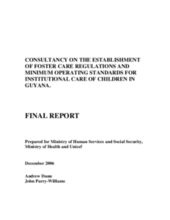The original terms of reference envisaged the preparation of Standards for the operation of Children’s Homes and the provision of foster care regulations. However the Initial Assessment carried out in April 2006 found that Guyana in common with many other Commonwealth countries was struggling to meet the present care and protection problems facing children because of outdated legislation and social work practice that was relying on residential care and had no history of community placements. The Initial Assessment recommended that improvements were needed to the social work systems and structures particularly in the areas of assessment, best interest decisions, care planning and case review. Many children were found to be in the Children’s Homes for reasons of poverty and would be able to return home with financial and social work support. For these reasons it was recommended that Guyana rebuild an effective child protection service and improve its social work practice. Guyana was assessed as needing to develop a range of family and community placements and that long term solutions/placements would be necessary for many children that would not be met by setting up foster care, which is short term and needs to be supervised.
Research carried out found the standards in the Children’s Homes to be poor, but the main issue was the absence of oversight and supervision of the placement by social workers. There were no care plans for any of the children in the Homes. Since April 2006 the Ministry of Human Services and Social Security (MoHSSS) has worked together with the Children’s Homes to develop quality care standards that will be voluntary, a system of registering the Homes and there is a set of regulations that is being prepared to enforce minimum standards should this be necessary. A “Child Protection Service” (CPS) has been established albeit without sufficient manpower and other resources but it is evidence of Government commitment. Child Protection processes and procedures are being put in place to protect children at risk of harm and abuse and to assess and review all residential care placements with a view to reintegration with the family or a community care placement.
Immediate Tasks for the MoHSSS centre on the need to establish the Child Protection Service with core staff, who have job descriptions in Regions 3, 4,5 and 6 to work with children who have been seriously abused or neglected or are at risk. The Child Protection Service staff need to assess and write care plans for all children in the Homes and begin the reintegration of children from the Homes to their own or a substitute family, An inspector needs to be appointed to work on the registration of all Children’s Homes and inspect all Homes to assess how they meet the quality Standards for Children’s Homes in Guyana and any legal Regulation for Minimum Standards and to set agreed targets for improvement.
Still outstanding are the provision of human resources for the CPS and the necessary reform of the law. The law reform process has been restarted and the law will need to reflect many of the changes discussed in this document. Also needed are the development of community care placements and services, particularly for under 5’s and a mechanism of cash transfer to prevent separation and family breakdown.
©UNICEF

